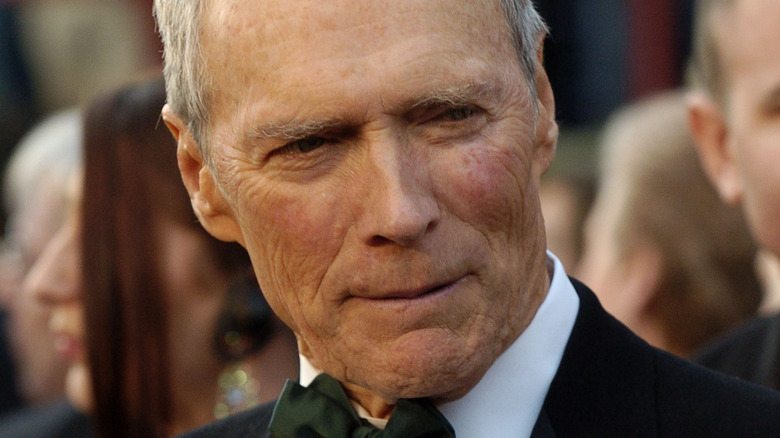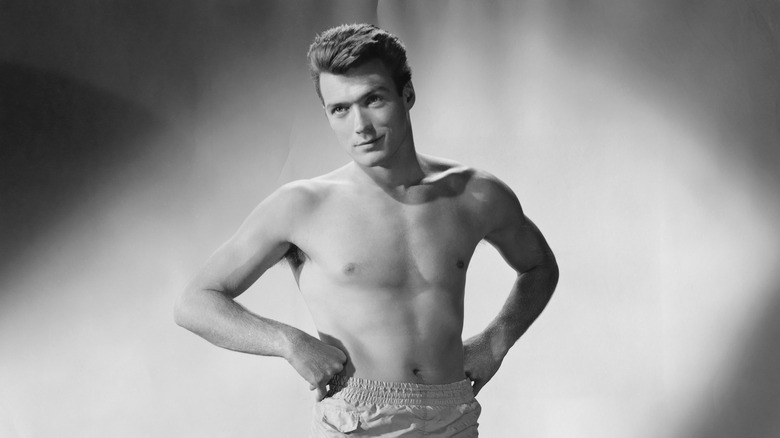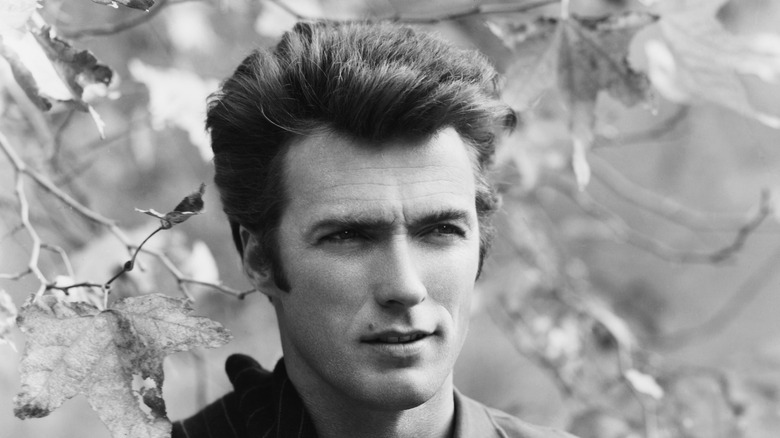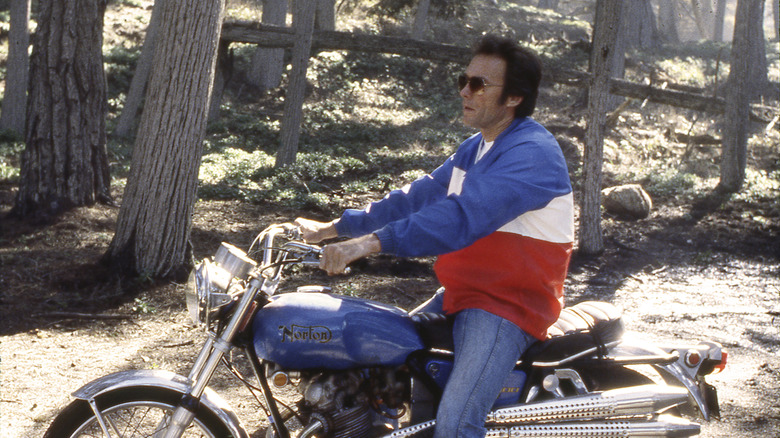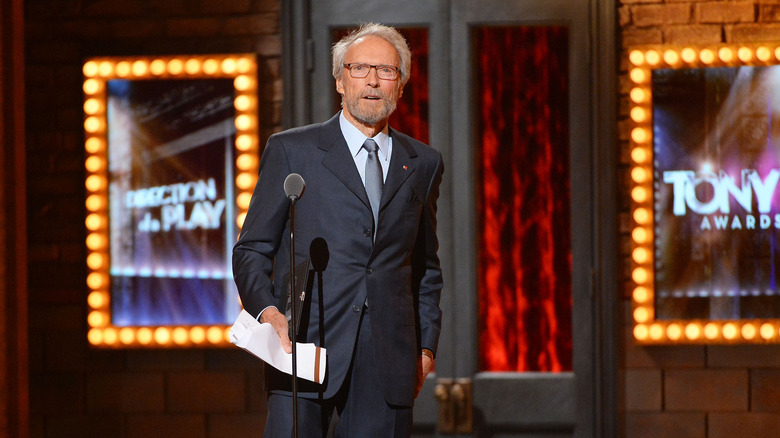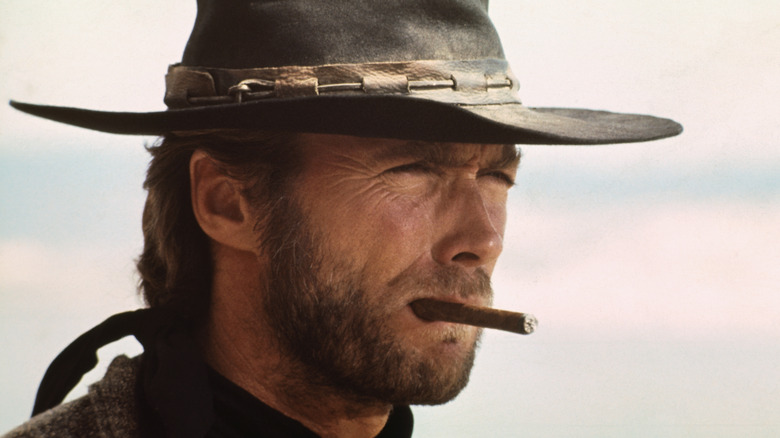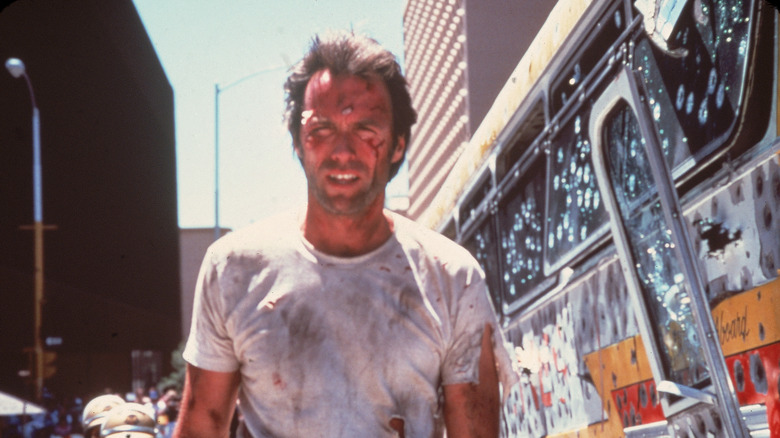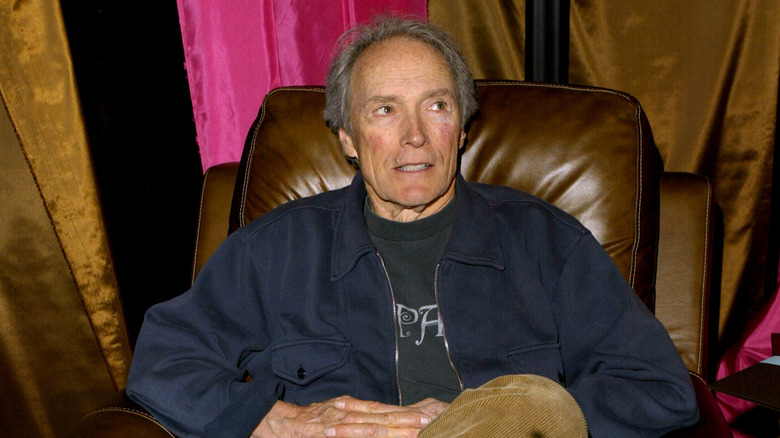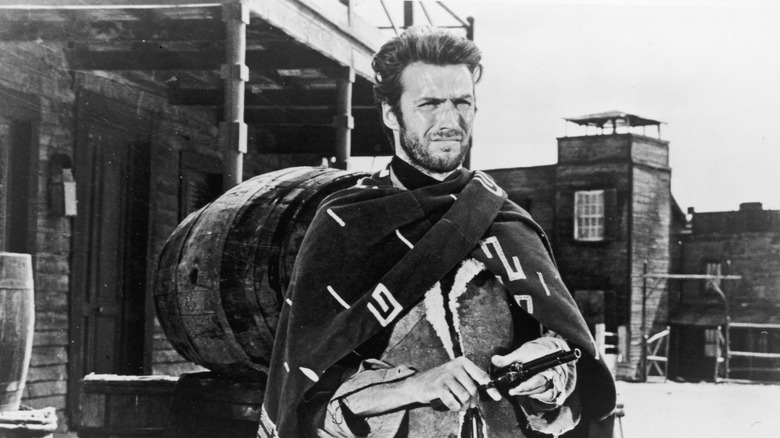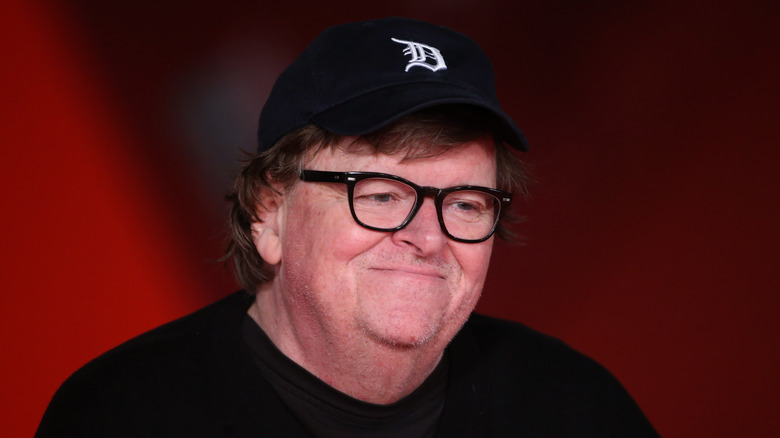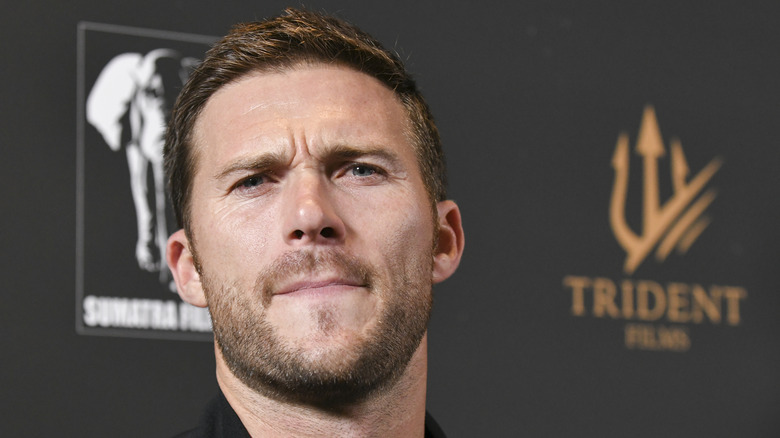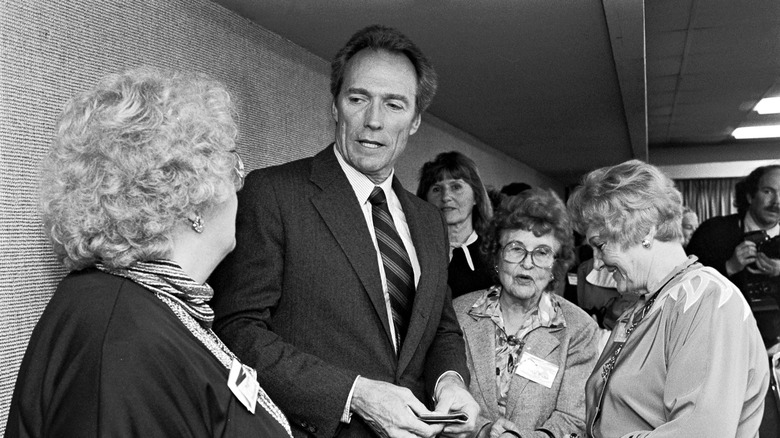Clint Eastwood: The Untold Story Of The Hollywood Legend
Actor and director Clint Eastwood is a larger-than-life character both on and off-screen. In his 90s at the time of writing, this Hollywood giant's very long life has been as action-packed as his career.
Although he took on bit-parts in films and tv from a relatively young age, Eastwood did not become a superstar until his 30s. Yet his years in relative obscurity are as interesting as his glory days, a time when he worked some tough blue-collar jobs, romanced women, and got into all kinds of trouble.
In the 1960s, he saw TV success as the cowboy lead in "Rawhide," and he received international acclaim while working on the "Dollars Trilogy." More recently he has won over hearts and minds with a series of Oscar-winning pictures that bravely delve into difficult topics such as race, masculinity, and war. Now a legend, his rough and macho persona still gets him to trouble occasionally, both in his dealings with family and with other stars. Still, there is more to Eastwood than meets the eye — his rich personal life, his musical career, and his political dabblings betray a multi-faceted figure with astonishing energy.
Eastwood is rumored to have been expelled from school for bad behavior
Growing up, Clint Eastwood didn't take his schooling particularly seriously. According to his own omission, throughout his teenage years, he was more interested in cars and girls than anything else. It didn't help that his parents moved so often that he changed schools with great regularity. Growing up he and his friends spent most of their time drinking, chasing girls, and drag-racing their cars in a fit of youthful abandon.
By the time he'd entered high school, he'd become something of a troublemaker. What actually happened remains something of a mystery but it seems that he was eventually asked to leave his second-to-last school, for bad behavior. According to Patrick McGiligan's "Clint: The Life and Legend," Eastwood invented a story that he'd left Piedmont High due to discomfort at the lack of racial diversity at the institution. However, it is not clear if there is any truth to this tale. A local newspaper printed a totally different story that he'd actually been expelled from the school for leaving a rude message on the athletic field scoreboard, and for burying somebody "in effigy on the school lawn."
A third version of the story was printed more recently by a California newspaper, The East Bay Monthly. In an interview with Piedmont High School's newest principal, the paper claimed that Eastwood had gotten in trouble with the school's administration before he even started riding his bike around on the school field. Eastwood moved to Oakland Technical School instead and graduated in 1948.
Eastwood had a variety of unlikely jobs before becoming an actor
Though he may be an actor, Clint Eastwood's manly image is no act — before working in the film industry, Eastwood had some of the most masculine jobs imaginable. Shortly after graduating High School, he embarked on an exciting Karouac-esque period, doing random jobs all over California and Oregon.
Eastwood worked at an Oakland steel mill and spent some time felling trees as a lumberjack. Although his job at the lumber yard almost killed him when a huge stack of logs dropped from a crane came tumbling toward him, he loved the camaraderie and the great outdoors.
Eastwood's period of wandering was cut short in the early '50s when he was drafted during the Korean War. He never saw any action but instead worked as a swimming instructor. He spent his army days moonlighting as a bouncer and working on his first few films. While his fellow soldiers went to war, he kicked drunk NCOs out of the officer's club, using his huge height to scare people away.
He survived a plane crash as a young man
During his brief stint in the army, Clint Eastwood went through a terrifying ordeal that could have come from one of his movies; while hitching a ride to Seattle on a bomber, the plane malfunctioned and was forced to crash land in shark-infested waters just off the coast of California.
The creaking old relic, a torpedo plane from WWII, had a whole host of terrifying technical problems that became obvious the moment it got in the air. According to Eastwood's own account, retold in Douglas Thompson's "Clint Eastwood: Sexual Cowboy," when they got into the air Eastwood noticed that the intercom used to communicate with the pilot wasn't working. It was not a good sign — and just the tip of the iceberg. Eastwood's oxygen didn't work either, causing the rookie to pass out mid-flight. When he came to, the plane had gotten lost in thick fog just off the coast and was starting to run out of fuel.
The engine came to a sharp halt in midair, and before long they'd hit the water. Fortunately, as an army swimming instructor, Eastwood was more than capable of saving himself. After swimming to the point of exhaustion through a jellyfish swarm in icy cold November conditions, he passed out on a nearby beach for a while, then wandered back to civilization unscathed.
In addition to acting and directing, Eastwood is a talented composer
Clint Eastwood is legendary for his acting and directing career, but his career as a musician is far less well-known. Eastwood is often remembered for saying that Jazz and Westerns are America's art forms — and both have preoccupied him for much of his life.
Eastwood has been passionate about various types of music since his youth, and like many musical people, he had a few amateur musicians in the family. His mother and father both dabbled with instruments, and Eastwood remembers copying the musicians he heard on his parents' records as a kid. Old jazz greats such as Art Tatum and Fat Waller became some of his favorites. Not for no reason did Eastwood choose to direct the critically acclaimed Charlie Parker biopic, "Bird."
Later in life, Eastwood grew to become a pretty good jazz pianist, adding "musician" to his laundry list of skills. For many of his best films, he composed the film scores himself. The gentle, melancholic music that accompanies perhaps his greatest Western, "Unforgiven," for example, was put together by Eastwood, with the help of musician Lennie Niehaus. By 1996, Eastwood was invited to play at Carnegie Hall, and in his old age, his passion for jazz has only grown. He told Vanity Fair in an interview in 2008 that his much-loved electronic piano travels with him wherever he goes.
Despite his cigar-chomping image, he hates smoking
Clint Eastwood is known for playing gritty characters — ringed by smoke and whiskey in hand. His performance as the cigar-chewing anti-hero cowboy from the Dollars Trilogy, for example, is arguably his most iconic role. Yet Eastwood hates smoking, and he could barely stand the taste long enough to film his scenes.
While shooting the Dollars films, both Eastwood and director Sergio Leone saw the value in using cigars as a character prop, especially given that the mysterious cowboy says very little throughout the course of the three movies. AFI reports that Eastwood picked up a bunch of cigars just before filming began, certain they would add something to his role. He was horrified to discover that smoking made him feel physically ill.
According to Patrick McGilligan's "Clint: The Life and Legend," the legendary actor hated it so much, he would get frustrated with Leone when he insisted on shooting scenes from multiple angles, forcing Eastwood to smoke the entire time. He told the director, "You'd better get it this time because I'm going to throw up." On the plus side, he has stated that when he needed to play a moody character it helped him to get into a grumpy state of mind. "I took a couple of draws and, boy, I was right there" (per Douglas Thompson, "Clint Eastwood: Sexual Cowboy").
Eastwood can fight for real and once hospitalized two sailors
"Million Dollar Baby" director Clint Eastwood has more than just a passing interest in fist-fighting — in real life, he really knows how to throw a punch. According to his biography "Clint: The Life and Legend," Eastwood lives up to his on-screen tough-guy persona, and during his youth, he and a friend once took on five guys at once.
Eastwood and lifelong friend Fritz Manes were at a bar in LA when a group of five rowdy sailors targeted the pair. When the group shouted homophobic abuse at Eastwood, picking up on his then fashionably wavy locks, Manes yelled back and the pair got into a scuffle. During the ensuing fight, Eastwood was punched square in the face, breaking his two front teeth which later had to be capped. Amazingly, the sailors came off worse in the brawl, with two of the five men rushed off to the hospital as a result of the punch-up. When asked about the incident, Manes claimed, "Clint literally almost killed these guys."
Eastwood's legendary toughness has never really waned and even today he is known in Hollywood as a fighter. In an interview with the Hollywood Reporter, Leonardo Di Caprio recalled that at the age of 81, Eastwood was still teaching his actors how to do fight scenes himself. While filming his movie "J.Edgar" he did a live demonstration. "There's Buddy [Van Horn] standing in the middle of the room and Clint says, 'I think it should be something like this' — and he explodes into Clint Eastwood the fighter and they start smacking each other around and rolling on the floor."
He is heavily into transcendental meditation
Underneath Clint Eastwood's tough guy exterior is a surprisingly spiritual man with a calm thoughtful center. Although Eastwood has said that he does not believe in God, he is serious about his spiritual practice and has made transcendental meditation a part of his daily routine for more than 40-odd years, since he was a young actor. In interviews, he has passionately advocated for meditation as a tool to reduce stress.
According to Patrick McGilligan's "Clint: The Life and Legend," Eastwood started practicing meditation after his co-star on the set of "Joe Kidd," played transcendental meditation tapes in her car while driving them both to work. At that time TM was just becoming fashionable in the West thanks to The Beatles. After the film concluded, he began sitting twice daily for the rest of his.
Speaking with GQ Magazine, Eastwood opened up about his practice and claimed that meditation has helped him better understand people who are religious. Speaking about his beliefs he said, "I believe you have a conscience and you have a soul. I don't know if it's injected into you; I think it's probably something inherited."
Eastwood couldn't speak to the Italian director of the Dollars Trilogy
When Clint Eastwood was still a relatively unknown actor he signed up to work with the then also little-known Italian director Sergio Leone. The pair's work on the "Dollars Trilogy" would propel them both to stardom, but at the time it must have seemed like a quirky decision on Eastwood's part; "A Fistful of Dollars" was shot in Spain and staffed with a European film crew. Despite playing the starring role, Eastwood couldn't actually talk to most of his coworkers.
According to Eastwood's biography, "Clint: The Life and Legend," Eastwood had the help of a translator to muddle through the film. However, Eastwood claimed that he often understood exactly what Leone was trying to communicate anyway, due to his characteristically Italian use of expressive hand gestures as well as his facial expressions. The language barrier ultimately made no difference to the success of the film which had very little dialogue anyway and grew to become a surprise smash hit at the box office.
He had a spat with Michael Moore
Clint Eastwood is not known for getting along well with others, having had a few star spats over the years. One of the most controversial has been with documentary maker Michael Moore. Eastwood clashed with Moore after threatening to kill the documentary maker at an awards dinner. Eastwood made reference to Moore's provocative gun control flick, "Bowling for Columbine," while making a speech to the crowded room which included Moore himself. Addressing the room, he told Moore that if he ever showed up at his house to film him (as he did to gun-lover Charlton Heston in the movie) — he'd kill him. Eastwood followed up the threat by stating, "I'm not joking ... I'll shoot you." Speculation about the feud continued to simmer when Moore later tweeted that he believed snipers were cowards, a comment people took as a criticism of Eastwood's gun-toting classic "American Sniper."
Moore also posted his own account of the "death threat" incident on Facebook and it was later reprinted in The Washington Post. He cast the event as an insensitive response to a serious issue. At a CinemaCon convention, held not long afterward, Eastwood dismissed Moore's complaints, joking, "Everyone kept saying I was going to kill Michael Moore but that's not true." He added, "It isn't a bad idea." At the convention, Eastwood complained that Heston had had Alzheimer's at the time that Moore hassled him. Moore never saw the funny side of the joke, stating that he had endured a number of threats throughout his career.
Eastwood is a notoriously tough father
Clint Eastwood has spawned many offspring by many different women. He is famously reticent about most of his eight kids, some of whom were brought into the world in scandalous circumstances. However, his youngest son, Scott Eastwood is well-known and has spoken quite candidly about his father, revealing the aging star to be a stern disciplinarian.
Like his father, Scott has had a reasonably successful career in the movie business as an adult — but he isn't a pampered child star by any means. Speaking with GQ Magazine, Scott told reporters that his father made sure he grew up with a strong work ethic; when he asked for money his father told him to make it himself, working nights at bars while attending auditions.
His dad was tough on him in many respects — sometimes shockingly so. Scott went to live with his father when he was in high school and during that time, an event occurred that could be called tough love or child abuse depending on your point of view. One night, furious with Scott's behavior, Clint punched his son in the face for abandoning his baby sister at a party. After his dad found out he'd left the 14-year-old alone, he threw Scott against a wall, wrang his neck, and punched him. Surprisingly, Scott expressed no upset about the incident and still speaks about his father with great respect.
Eastwood was briefly mayor of Carmel, CA
In 1986, Clint Eastwood began a short-lived political career as mayor of the quirky if slightly fascist town of Carmel, CA. Carmel is known for a number of odd laws and traditions including a prohibition on high-heels over a certain height, a ban on fast-food chains — and most notoriously a short-lived law against selling ice cream cones, a measure that Eastwood himself would overturn to the delight of children and sweet-toothed adults alike.
Eastwood's motivation for getting into politics was personal; he had been denied planning permission by the city council for a pet project but he also wanted to bring ice cream back to Carmel (per Patrick McGilligan's "Clint: The Life and Legend,"). Borrowing one of Ronald Reagan's election consultants, Eastwood successfully sold himself as a champion of freedom in the uptight little town, coming to bring ice cream back to the masses. Perhaps partly due to his star appeal, Eastwood won by a landslide.
Douglas Thompson reports in his bio "Clint Eastwood: Sexual Cowboy," that Eastwood achieved many positive things before stepping down from his one term as mayor in 1988; among his many achievements, he expanded the local library and improved the public water supply, and allowed residents to enjoy their cones hassle-free.
